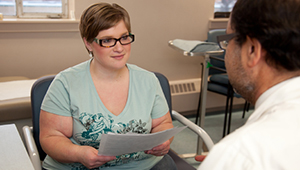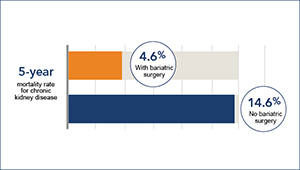Obesity
Research overview
“Obesity is the number-one health problem in the United States because it negatively affects our population’s health more than any other condition,” said Kaiser Permanente Washington Health Research Institute Senior Investigator David Arterburn, MD, MPH. Kaiser Permanente Washington researchers are doing practical research to learn how doctors, patients, families, employers, and policymakers can best work together to prevent and treat obesity.
“We’re focusing on three ways to halt the obesity epidemic,” said Senior Investigator Dori Rosenberg, PhD, MPH. “We’re helping to change obesity-promoting environments, bringing evidence-based prevention and treatment programs into health care systems, and helping people develop lifelong healthy diet and activity habits.”
Kaiser Permanente Washington obesity research areas include:
- reducing sedentary behavior and promoting physical activity and healthy diet in various age groups, populations with chronic conditions, and families;
- shared decision making to help patients find the best way to a healthy weight;
- implementing health coaches in primary care to support behavior changes;
- social networks that support lifestyle change programs;
- relationships between medications and genetic factors in developing obesity;
- health system, community, and national policies that address obesity;
- relationships between obesity and depression, diabetes, and other conditions; and
- long-term benefits and risks of bariatric (weight loss) surgery.
“Obesity is caused by many factors, so at Kaiser Permanente Washington, we’re working on many levels,” said Paula Lozano, MD, MPH, a senior investigator and Kaiser Permanente Washington’s assistant medical director for preventive care. “We’re improving health care to help people who are obese now. But since obesity is a societal problem, we’re also studying how to change our homes and workplaces and neighborhoods to create more healthy environments.”
Recent publications on Obesity
Coleman KJ, Schlundt DG, Bonnet KR, Holmquist KJ, Dunne J, Crull E, Hanaoka BY, Lent MR, Nadglowski J, Sylvia L, Venkatachalam S, Xanthakos SA, Zeiger R, Arterburn D, Williams N, Courcoulas A, Anau J, McTigue KM, Blalock C, Malanga E, McClay J, McBride CL, Schlundt D, Emiliano A, Nemr R, McTigue K, Courcoulas A, Xanthakos SA, Michalsky M, Coleman KJ, Murali S, Tavakkoli A, Desai N, Apovian C, Clark J, Nauman E, Cirielli E, Nadglowski J, St Clair T, Tice J, Vitello J, Zeiger R, Arterburn D, Anau J, Janning C, Williams N Understanding the Bariatric Patient Perspective in the National Patient-Centered Clinical Research Network (PCORnet) Bariatric Study 2020 May;30(5):1837-1847. doi: 10.1007/s11695-020-04404-8. PubMed
McTigue KM, Wellman R, Nauman E, Anau J, Coley RY, Odor A, Tice J, Coleman KJ, Courcoulas A, Pardee RE, Toh S, Janning CD, Williams N, Cook A, Sturtevant JL, Horgan C, Arterburn D, PCORnet Bariatric Study Collaborative Comparing the 5-Year Diabetes Outcomes of Sleeve Gastrectomy and Gastric Bypass: The National Patient-Centered Clinical Research Network (PCORNet) Bariatric Study 2020 May;155(5):e200087. doi: 10.1001/jamasurg.2020.0087. Epub 2020-05-20. PubMed
Coleman KJ, Fischer H, Arterburn DE, Barthold D, Barton LJ, Basu A, Courcoulas A, Crawford CL, Fedorka P, Kim B, Mun E, Murali S, Reynolds K, Suh K, Wei R, Yoon TK, Zane R Effectiveness of Gastric Bypass Versus Gastric Sleeve for Cardiovascular Disease: Protocol and Baseline Results for a Comparative Effectiveness Study 2020 Apr 6;9(4):e14936. doi: 10.2196/14936. Epub 2020-04-06. PubMed
Aminian A, Zajichek A, Arterburn DE, Wolski KE, Brethauer SA, Schauer PR, Nissen SE, Kattan MW Predicting 10-Year Risk of End-Organ Complications of Type 2 Diabetes With and Without Metabolic Surgery: A Machine Learning Approach 2020 Apr;43(4):852-859. doi: 10.2337/dc19-2057. Epub 2020-02-06. PubMed
Courcoulas A, Coley RY, Clark JM, McBride CL, Cirelli E, McTigue K, Arterburn D, Coleman KJ, Wellman R, Anau J, Toh S, Janning CD, Cook AJ, Williams N, Sturtevant JL, Horgan C, Tavakkoli A, PCORnet Bariatric Study Collaborative Interventions and Operations 5 Years After Bariatric Surgery in a Cohort From the US National Patient-Centered Clinical Research Network Bariatric Study 2020 Mar;155(3):194-204. doi: 10.1001/jamasurg.2019.5470. PubMed
Researchers in Obesity
 David E. Arterburn, MD, MPHSenior Investigator |
 Allen Cheadle, PhDSenior Investigator, KPWHRI; Senior Research Associate, CCHE |
 Andrea J. Cook, PhDSenior Biostatistics Investigator |
 Maricela Cruz, PhDAssociate Biostatistics Investigator |
 Nicole M. Gatto, PhD, MPHPrincipal Collaborative Scientist |
 Beverly B. Green, MD, MPHSenior Investigator |
 Mikael Anne Greenwood-Hickman, MPHSenior Collaborative Scientist |
 Paula Lozano, MD, MPHSenior Investigator; Director, ACT Center |
 Dori E. Rosenberg, PhD, MPHSenior Investigator |
 Gregory E. Simon, MD, MPHSenior Investigator |











